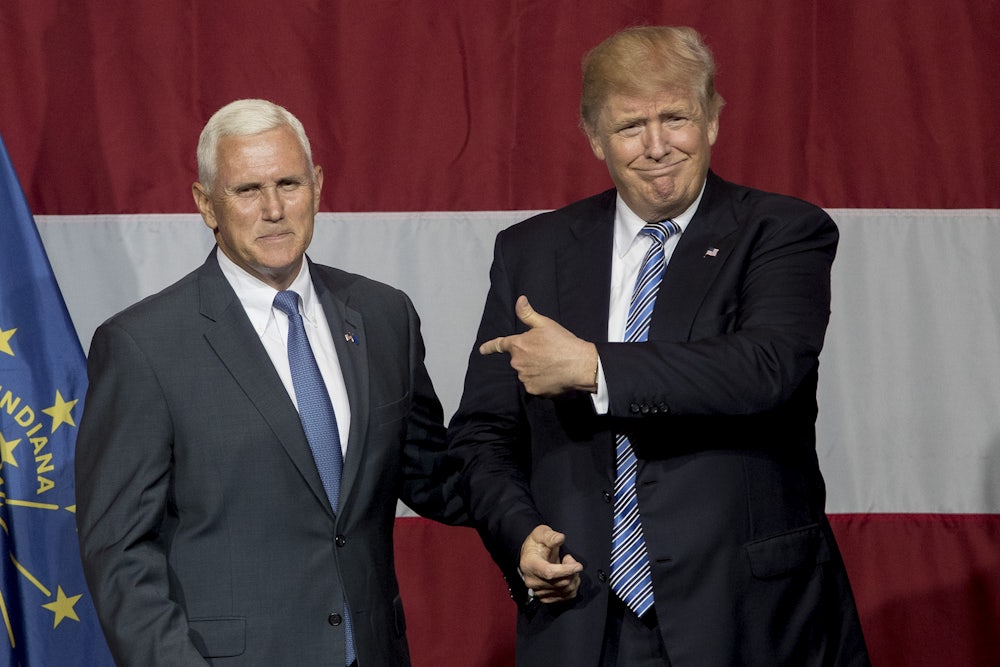The conventional wisdom that Indiana Governor Mike Pence would be the GOP vice presidential nominee with the highest upside and the lowest downside risk for Donald Trump took hold as soon as Pence entered consideration. “Donald Trump’s presidential campaign has been unconventional, but naming Indiana Gov. Mike Pence as Trump’s running mate would be a quite conventional move,” wrote Andrew Downs, the director of the Center for Indiana Politics, in The Washington Post. “Pence would balance the ticket in almost every way.”
There are few dissenters to this view. But it is less a testament to any consensus that Pence is a good politician, or a good fit for Trump, than to the unusual terribleness of the other candidates under consideration.
Unlike New Jersey Governor Chris Christie, and former House Speaker Newt Gingrich, Pence isn’t weighed down by dump trucks full of legal or ethical dirt. Pence is an evangelical, and as far as we know he’s not a philandering one. He was once considered a factional leader of the ideological right. And he has enough recent experience in Congress, and scandal-free governing experience in Indiana, to help Trump calm jittery Republican nerves and win more full-throated endorsements from party leaders and officials.
If we’re not being gamed—if Trump really has selected Pence—the real significance is that Trump won’t let himself lose the election through complete neglect. Trump is probably too unpopular to win anyhow, but he definitely can’t if he makes literally no concessions to Republicans and movement conservatives.
A dependable sort like Pence is a necessity for Trump, even if he’s not ultimately sufficient. But that is the complete extent to which Pence can be thought of as an asset.
Think ahead from Trump’s perspective. If Pence were ever called upon to fulfill a running mate’s basic function—if Trump exited the race for any reason, or became unable to fulfill the duties of the presidency—Trumpism would be dealt a crippling blow. In a way it would be as if Trump never existed. Whatever Trump is, he is not a movement conservative, while Pence very much is.
This is not to overstate things. As Bernie Sanders explained in so many words when he endorsed Hillary Clinton this week, Trump’s racism obscures the fact that much of his agenda—lower taxes, less environmental, and financial regulation, and so on—is familiar conservative sop for the GOP donor class. But with the partial exception of his enforcement-only views about immigration reform, Pence doesn’t stand for any of the things Trump promises to change about the Republican Party. To the contrary, his record and Trump’s agenda contradict one another in critical ways.
Consider:
- Trump opposes cuts or changes to retirement programs like Social Security and Medicare; Pence backed radical reforms to those programs, and used to criticize President George W. Bush’s Social Security privatization plan because it wasn’t radical enough.
- Pence supports the trade agreements Trump deplores.
- Pence supported the war in Iraq. Whatever Trump once thought of that endeavor, he now criticizes Republicans who beat the drum for it in the most withering terms.
Pence is for most purposes a doctrinaire social conservative, business conservative, and neoconservative. He opens the Trump campaign up, in other words, to the kind of attacks that doomed the Romney campaign: war on women; war on the working class; war on everyone. His greatest defenses against these criticisms are that as Indiana governor he worked with the Obama administration to expand his state’s Medicaid program under the Affordable Care Act; and ultimately turned against legislation that would have allowed Indiana business owners to discriminate against LGBT people. But these are ultimately moderate, bread-and-butter-style decisions Pence won’t want to draw attention to.
The incompatibilities don’t end there. As much as they are ideological misfits, they’re also temperamental and geographic misfits.
Pence is a bad talker. He will have to explain his deviations from Trumpism, from opposing Trump’s proposed ban on Muslim travel, to supporting the Trans Pacific Partnership, to answering for any new Trump controversy in the weeks and months ahead, and he will do badly at it. By the same token, he will do a poor job explaining his views on everything from abortion to the health impact of smoking. And when it’s all over, it’s not even clear Pence can help Trump in Indiana—a state Hillary Clinton doesn’t need to win anyway—because his popularity is under water there.
Because he is neither erratic nor corrupt—because he doesn’t amplify Trump’s worst qualities—Pence is being celebrated as a sober and steadying force for Trumpland. Someone who might even make it easier to treat the major party campaigns as equivalents. But this is the soft bigotry of low expectations.
